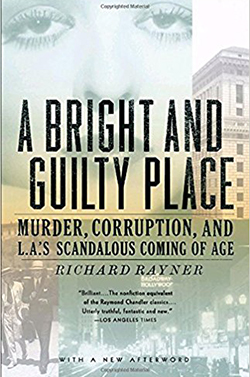
Best Book of the Year
The Los Angeles Times • The Washington Post
Los Angeles was the fastest growing city in the world, mad with oil fever, get-rich-quick schemes, and celebrity scandals. It was also rife with organized crime, with a mayor in the pocket of the syndicates and a DA taking bribes to throw trials. In A Bright and Guilty Place, Richard Rayner narrates the entwined lives of two men, Dave Clark and Leslie White, who were caught up in the crimes, murders, and swindles of the day. Over a few transformative years, as the boom times shaded into the Depression, the adventures of Clark and White would inspire pulp fiction and replace L.A.’s reckless optimism with a new cynicism. Together, theirs is the tale of how the city of sunshine went noir.
The Washington Post
In the early 1980s, just before Los Angeles put on its second Olympic Games, British journalist Richard Rayner came here and fell reluctantly, madly in love with this city. Los Angeles -- from which I write -- offered him a blithe nuttiness: earthquakes, civil unrest, mindless heat (Rayner once spied a hapless citizen trying to take shelter from the sun in the shade of a telephone pole) and especially, a panoply of truly grotesque and off-the-wall crime.
In "A Bright and Guilty Place," Rayner uses crime as a key to the secrets of this seductive metropolis, and the time frame he has chosen seems unnervingly appropriate for today: He begins with the last few euphoric years before the crash of 1929 and continues a few more years, into the depths of the Depression, by which time somber reality had knocked optimistic if corrupt L.A. off its shaky emotional pins.
To love this book you have to love the wonderful novels of Raymond Chandler or James Ellroy, where only the flimsiest veneer of freshness and glamour covers a decaying, even disgusting reality. If you can go along with that point of view, this social history will be a bonanza for you, a boundless source of creepy joy.
From Los Angeles Times: 'A Bright and Guilty Place' by Richard Rayner
Everything has its counterpart. For every piece of matter there is a like piece of antimatter, for every movie star there is or will be a like TV star. For every Steve McQueen a Lee Majors, for every Marlon Brando an Arthur Fonzarelli. (These facts have been established.)
In his brilliant new book, "A Bright and Guilty Place," Richard Rayner has given us, finally and definitively, the nonfiction equivalent of the Raymond Chandler classics that fell like hammer blows in the middle of last century: "Farewell, My Lovely," "The Long Goodbye," "The Big Sleep." Chandler turned fact, the criminal underworld of Depression-era Los Angeles, into fiction, and now Rayner, by a strange Didion-like alchemy, has turned fiction back into fact. Not to say he has dug up the story behind the story, as a reporter might profile the real white whale, but that he has run the world of Chandler through the machine a second time, the result being utterly truthful, fantastic and new.
At the center of the book stand two characters, the good soul and the killer, Abel and Cain, around whom the story spins as cotton candy spins its wispy strands around a paper handle: Leslie White, "sickly, smart, dedicated, eager to be good," who moved to Los Angeles in 1928 and took a job as an investigator at the district attorney's office, where his optimism was soon ground down (he would become a writer of pulp fiction); and Los Angeles native Dave Clark, who traced his lineage to explorer William Clark. You could not invent a more dashing character than Clark -- a fighter pilot, champion golfer and double-fisted drinker who became the kind of celebrity prosecutor whose thoughts inevitably turn to politics.
Available on Amazon.